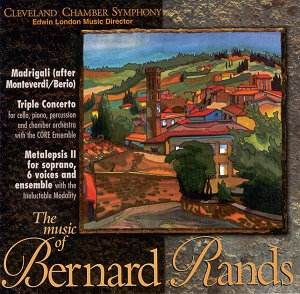The British-born composer Bernard Rands studied with
Luciano Berio who has since become a firm friend; and all three works
here are connected with Berio in one way or another. The first performance
of Metalepsis II, dedicated to Bruno Maderna, was conducted
by Berio whereas Madrigali was undoubtedly inspired by
Berio’s own transcription of Monteverdi’s Il Combattimento. Finally,
Rands’ most recent piece in this release Triple Concerto
is dedicated to Berio.
Berio, however, also had a lasting musical influence
on Rands’ own music, and some earlier works such as Canti Lunatici
(1980) and Metalepsis II (1971) certainly call Berio to
mind, not only for the music but also for the way in which Rands approaches
word setting (and also his choice of multi-lingual ‘libretto’). Central
to Metalepsis II is John Wain’s poem Wildtrack
which deals with the subject of tyranny as symbolised in the lives of
Joseph Stalin and Henry Ford. (Rands also composed three works titled
Wildtrack, which does not say much since Wildtrack 2
[1973] has words by Samuel Beckett.) Actually the composer centres his
work on a shorter passage from Wain’s poem subtitled Hymn to Steel:
For 5 Million Human Voices and adds various quotations from Chairman
Mao, the Pope (which one we are not told) and passages from the Latin
Mass. Most texts in different languages nevertheless deal, so we are
told, virtually with the same issues. Such variation technique, as it
were, thus emphasises the global emotional and even social impact of
the work which, musically speaking, is rather similar to Berio’s own
Laborintus 2, though the basic idea is quite different.
Rands conjures up a troubled world in which many voices strive to be
heard without necessarily being always successful in doing so. Rands’
music here runs the whole gamut of modern vocal techniques as encountered
in many works by Berio and his contemporaries, but always aiming at
direct communication which it achieves in an almost visceral way. Metalepsis
II may be experienced as a "non-denominational Requiem
Mass for all who suffer at the hands of tyrants – political, religious
and commercial"; but it also is, in its own way and for all its
complexity and sophistication, a powerfully impressive protest work.
As already mentioned, Madrigali refers
to Berio’s own preoccupations with the music of Monteverdi. So, the
materials of the five short movements of Madrigali (incidentally,
each movement is dedicated to former students of Rands) are derived
from or based on the musical characteristics found in Monteverdi’s Eighth
Book of Madrigals without actually quoting any of it, except in
the last movement. Thus the music explores some Monteverdi musical characteristics
and sets them into some new musical context. Madrigali,
scored for chamber orchestra, is a beautiful and fascinating orchestral
homage both to Monteverdi and Berio, as well as a wonderful essay in
subtle, luminous scoring.
The more recent Triple Concerto, dedicated
to Berio, of which the present recording is its world premiere, was
commissioned by the Core Ensemble (cello, piano and percussion). The
title obviously refers to the solo trio but also to the fact that the
orchestral forces are divided into three smaller groups, each of them
being associated with one of the soloists. Thus, cello and Ensemble
III, piano with Ensemble I and percussion with Ensemble II. Most of
the work’s unfolding process consists in interplay and confrontation
between the soloists and between the three instrumental groups (with
or without their soloist). This is a substantial work full of passion
and lyricism, colour and energy; and one of Rands’ most approachable
and attractive works
Performances are excellent throughout and are superbly
recorded.
This wonderful release undoubtedly provides for a thought-provoking
survey of Bernard Rands’ musical journey and also a good introduction
to his often beautiful sound world and his honest and serious musical
thinking; and it is thus warmly recommended.
Hubert Culot


